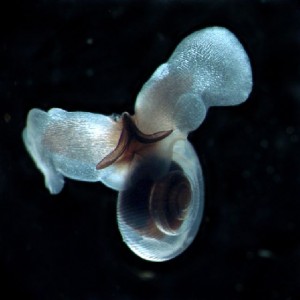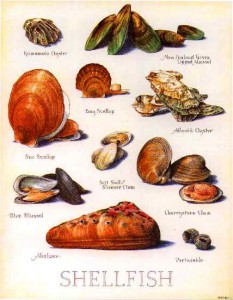As we continue to release anthropogenic carbon into our atmosphere the earth warms. The ocean however is actually fighting to combat these changes by absorbing some of the heat. This sounds like an answer to our problems, but there is a catch: the oceans are becoming more acidic. As carbon dioxide concentrations increase in the seawater, the carbonate concentrations decrease. Carbonate is a key building block of the shells of many aquatic organisms and the decreased concentration is having negative effects.
Take a minute to check out this video for a quick explanation of how global warming is causing ocean acidification. 
An in depth case study was done on one Arctic mollusc, Limacina helicina, to test the effects of increasingly acidic waters. The full research paper can be found here, or you can check out the news article for a condensed version here. These “sea butterflies” or pteropods, were kept in a controlled environment for 5 days to see how well their shells grew under different pH values. A pH value of 8.09 (which was recorded in the Arctic in 1900) and a pH value of7.78 (the projected value for 2100) were used. The results were a startling 28% decrease in linear shell growth for those kept at the acidic pH compared to those kept in the normal ocean pH.
So what does this mean with respect to ocean ecosystems? Decreased shell growth may not seem immediately fatal to thepteropods an associated ecosystems but the associated decrease in shell density has some larger effects.
In the Arctic pteropods form the base of the food chain and are eaten by many larger organisms. As the oceans become more acidic the pteropods can’t grow or mature as quickly. They also can’t swim away as quickly from their prey and are eaten more often. With a diminishing population of pteropods, organisms that rely on them for food will also be at risk.
Pteropods also play an important role in the geochemical cycle, namely transferring carbon to the deep. However, with decreased shell density pteropods do not sink as well and so they are not transferring carbon. Without carbon cycling in the ocean the effects of global warming would be much worse.
These results are not specific to just pteropods; similar studies have been done on other shellfish and corals which found similar results. Ocean acidification is causing global effects and the scariest part is that most of them are still unknown. At this point we can only predict how acidic the ocean will get due to global warming and how strongly shellfish and their respective ecosystems will be affected.


